“Have you a theory about it?” asked Diana.
“Yes, I have. Have you?”
Diana nodded. “I don’t think boys and girls should be educated from the same angle.”
“No? Why not?” Enoch’s blue eyes were eager.
“Wandering about the desert among the Indians, one has leisure to think and to observe the workings of life under frank and simple conditions. It has seemed to me that the boy approaches life from an entirely different direction from a girl and that our system of education should recognize that. Both are primarily guided by sex, their femaleness or their maleness is always their impelling force. I’m talking now on the matter of the spiritual and moral training, not book education.”
“Why not include the mental training? I think you’d be quite right in doing so.”
“Perhaps so,” replied Diana.
They were silent for a moment, then Enoch said, with a quiet vehemence, “Some day they’ll dare to defy the creeds and put God into the public schools. I don’t know about girls, but, Miss Allen, the growing boys need Him, more than they need a father. Something to cling to, something high and noble and permanent while sex with all its thousand varied impulses flagellates them! Something to go to with those exquisite, generous fancies that even the worst boy has and that even the best boy will not share even with the best mother. The homes today don’t have God in them. The churches with their hide-bound creeds frighten away most men. Think, Miss Allen, think of the travesty of our great educational system which ignores the two great facts of the universe, God and sex.”
“You’ve never put any of this into your public utterances.”
“No,” replied Enoch, “I’ve been saving it for you,” and he looked at her with a quiet smile.
Diana could but smile in return.
“And so,” said Enoch, “returning to the answer to your original question, I have found it hard to keep to any sort of fine idealism, partly because of my own inward struggles and partly because politics is a vile game anyhow.”
“We Americans,” Diana lifted her chin and looked into Enoch’s eyes very directly, “feel that at least one politician has played a clean game. It is a very great privilege for me to know you, Mr. Huntingdon.”
“Miss Allen,” half whispered Enoch, “if you really knew me, with all my inward devils and my half-achieved dreams, you would realize that it’s no privilege at all. Nevertheless, I wish that you did know all about me. It would make me feel that the friendship which we are forming could stand even ’the wreckful siege of battering days’!”
“There was a man who understood friendships!” said Diana quickly. “He said in his sonnets all that could be said about it.”
“Now don’t disappoint me by agreeing with the idiots who try to prove that Shakespeare wrote the sonnets to a man!” cried Enoch. “Only a woman could have brought forth that beauty of song.”




